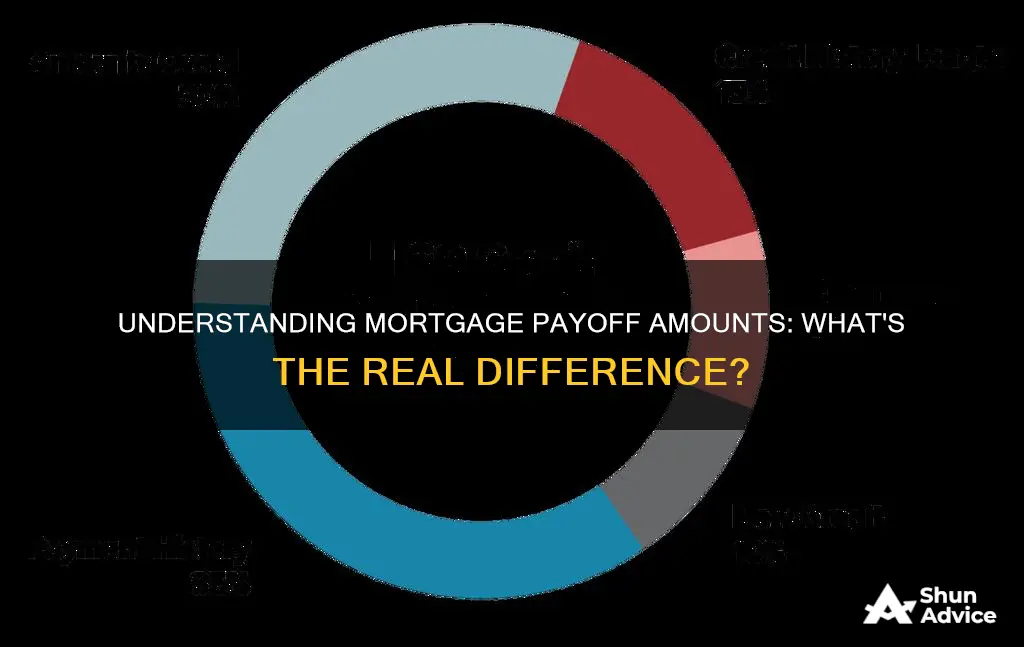
When it comes to mortgages, the payoff amount is a crucial concept to understand. It refers to the total sum you need to pay to fulfil the terms of your mortgage loan and become entirely debt-free. This payoff amount is distinct from the current balance of your loan, as it includes interest accrued up to the payoff date and any additional fees. Understanding the payoff amount is essential for financial planning, as it helps you estimate how long it will take to become mortgage-free and determine if refinancing is a viable option. Calculating the payoff amount can be challenging due to the involvement of terms like principal, interest rate, and amortization. However, online calculators and financial advisors can assist in navigating these complexities and making informed decisions about extra payments or refinancing.
| Characteristics | Values |
|---|---|
| Payoff amount | The total amount that must be paid to satisfy the terms of a mortgage loan and completely pay off the debt |
| Difference from current balance | The payoff amount is different from the current balance, which might not reflect the total amount owed to satisfy the loan |
| Components | The payoff amount includes interest due through the day the loan is paid off and other fees that have been charged but not yet paid |
| Prepayment penalty | If the loan is paid off early, a pre-payment penalty may be charged |
| Calculation | The payoff amount can be calculated using an amortization schedule or an online mortgage calculator |
| Benefits of calculation | Calculating the payoff amount can help with future financial planning, deciding whether to refinance, and saving money on interest |
| Strategies for early payoff | Making extra payments, paying off high-interest debt first, and bi-weekly payments |
What You'll Learn

The payoff amount is higher than the remaining balance
The payoff amount on a mortgage is the total amount that you will pay before your mortgage and all of the interest is completely paid off. This is different from the principal amount, which is the amount that you borrow to pay for your home. The payoff amount is calculated by adding up the principal and the interest that accrues from the statement date to a specific payoff date. This means that the payoff amount is usually higher than the remaining balance.
For example, let's say you have a mortgage with a principal amount of $400,000. Over time, you make payments towards this principal amount, reducing the outstanding balance. However, interest is also accruing on the remaining balance, increasing the total amount you owe. By the time you reach the payoff date, the total amount you have paid, including interest, may be higher than the original principal amount.
There are a few reasons why the payoff amount on a mortgage can be higher than the remaining balance. One reason is that the interest on the loan is calculated and compounded periodically, such as monthly or annually. This means that even if you have made payments towards the principal, the interest is continuously adding to the total amount owed. Additionally, there may be other fees and charges associated with the mortgage, such as prepayment penalties or release/reconveyance fees, which can increase the payoff amount.
Furthermore, the timing of your payments can also affect the payoff amount. If you make a payment after the statement date, the interest for that period will still be added to the payoff amount, even though you have already made a payment. This can result in a higher payoff amount than expected. Additionally, if you are paying off your loan early, you may be charged a pre-payment penalty fee, which will increase the payoff amount.
To calculate the payoff amount for a mortgage, you can use an online mortgage calculator or amortization schedule. These tools allow you to input the remaining balance, interest rate, and other fees to estimate the total amount you will need to pay to satisfy the terms of your mortgage loan. By understanding the payoff amount, you can make informed decisions about your finances and work towards becoming mortgage-free.
Matthew Cox's Mortgage Swindle: How Did He Do It?
You may want to see also

The payoff amount includes interest and fees
The payoff amount on a mortgage is the total amount that you will pay before your mortgage and all of the interest is completely paid off. This is different from the principal amount, which is the amount that you borrow to pay for your home. The payoff amount includes interest and fees, which is why it is higher than the remaining balance on the home.
When you take out a mortgage, you will be charged interest on the principal amount. This interest is the lender's charge for borrowing the money, and it is typically a percentage of the outstanding principal. The interest is calculated and added to the principal amount over time, so the total amount you owe increases even if you are making regular payments. This is why the payoff amount is higher than the remaining balance on the home.
In addition to interest, the payoff amount may include other fees, such as a release/reconveyance fee, a payoff statement fee, or a pre-payment penalty fee if you are paying off the loan early. These fees can vary depending on the lender and the specific terms of the mortgage.
It's important to note that the payoff amount is not the same as the current balance on your mortgage. The current balance may not reflect the total amount you owe to completely satisfy the loan. This is because the interest on a mortgage is typically calculated in arrears, so when you make a payment, it covers the interest for the previous period rather than the current period. Therefore, the payoff amount includes the interest that has accrued since the last payment.
To calculate the payoff amount for a mortgage, you can use an online mortgage calculator or amortization schedule. These tools can help you understand how much you will need to pay to satisfy the terms of your mortgage loan and completely pay off your debt. By inputting information such as the remaining balance, interest rate, and monthly payment values, you can estimate the total payoff amount and determine how long it will take to become mortgage-free.
Ford's Risky Move: Betting All Assets to Stay Afloat
You may want to see also

Calculating the payoff amount helps with financial planning
Calculating the payoff amount on a mortgage can be a daunting task, but it is essential for financial planning. It helps you manage your finances and gives you more control over your mortgage. The payoff amount is the total amount you will pay before your mortgage and all the interest are completely paid off. This is different from the principal amount, which is the amount you borrow to pay for your home. Over time, you will pay back more than the principal amount due to the interest.
The payoff amount is different from your current balance. Your current balance may not reflect the total amount you need to pay to satisfy the loan. The payoff amount includes the payment of any interest due through the day you intend to pay off your loan. It may also include other fees you have incurred and have not yet paid. If you are paying off your loan early, you may also have to pay a pre-payment penalty.
Understanding an amortization schedule is crucial for calculating your mortgage payoff accurately. It shows how each payment lowers the main amount owed and reduces the interest over time. Amortization schedules are also useful for visualizing the impact of making extra payments. You can add different situations to the schedule to see how extra payments can shorten your loan term and save you money on interest.
Rent vs. Mortgage: How Close Should They Be?
You may want to see also

Extra payments can reduce interest and loan term
Making extra payments on your mortgage can be a great way to save money and pay off your loan faster. By paying more than the minimum monthly payment, you can reduce the principal balance, which can lead to an early payoff and a reduction in interest charges over the life of the loan.
For example, let's consider a $300,000 30-year fixed-rate mortgage with a 6.75% interest rate. The monthly payment for this loan is approximately $1,946. By making 13 payments of this amount each year instead of 12, you can shorten your repayment term by almost six years. This means your loan will be paid off in about 24 years instead of 30.
Additionally, making extra payments can result in significant interest savings. For instance, if you have a $300,000 30-year mortgage at a 6.75% rate, making just one extra payment of $1,946 in the first year will reduce your total interest paid by over $12,000. Similarly, paying an extra $100 each month on a $300,000 30-year fixed-rate mortgage with a 6.75% interest rate can lead to interest savings of roughly $65,000.
Another strategy to make extra payments is to pay half-monthly instalments every two weeks instead of a full monthly payment. This effectively results in 13 monthly payments per year, with the extra payment going towards reducing the principal balance. This method can help shorten the loan term and reduce the total interest paid.
It is important to carefully consider your financial situation and long-term goals before deciding on a strategy to make extra payments on your mortgage. While it may require some short-term sacrifices, paying extra can lead to substantial financial benefits in the long run.
Mortgage Pre-Approval: What Can I Afford?
You may want to see also

Payoff amount is different from the principal amount
The payoff amount on a mortgage is different from the principal amount. The principal amount is the remaining principal due on the loan. Lenders provide monthly statements that report the principal balance, and this information is also available by contacting the lender or checking online. With a fully amortizing loan, part of the monthly payment goes towards paying down the principal.
However, the payoff amount is the total amount owed to pay off the loan in full on a specific day. It includes the principal balance plus any interest accrued up to the payoff date. Mortgages are paid in arrears, meaning that the monthly payment covers the interest for the previous month. For example, if a payment is made on May 1, it covers the interest for the period of April 1 to April 30. Therefore, if the payoff date is before the end of the month, the payoff amount will include interest accrued from the start of the month until the payoff date.
Additionally, the payoff amount may include various fees and charges. These can include release or reconveyance fees, payoff statement fees, escrow balances, insurance, taxes, and pre-payment penalties if the loan is paid off early. These extra costs can add to the overall payoff amount, making it higher than the principal balance.
It is important to note that the payoff amount is not a static number and can change over time. This is because the interest accrues daily, and the fees and charges may vary depending on the specific circumstances. Therefore, it is recommended to request an up-to-date payoff amount from the lender or servicer to obtain an accurate figure for the total amount required to satisfy the loan obligations.
Mortgaging Money: 2008's Financial Crisis and its Profiteers
You may want to see also
Frequently asked questions
A mortgage payoff amount is the total amount that you will pay before your mortgage and all of the interest is completely paid off. This is different from the principal amount, which is the amount you borrow to pay for your home.
The payoff amount is calculated by adding the interest accrued from the statement date to a specific payoff date to the principal balance. It may also include other fees such as a release/reconciliation fee, a payoff statement fee, and a pre-payment penalty fee if the loan is paid off early.
The payoff amount is higher than the remaining balance because the remaining balance might not reflect how much you actually owe to completely satisfy the outstanding loan balance. The payoff amount includes the payment of any interest due through the day you intend to pay off your loan.
You can calculate your mortgage payoff amount by using an amortization schedule or an online mortgage calculator. An amortization schedule shows how each payment lowers the main amount owed and reduces the interest over time.







